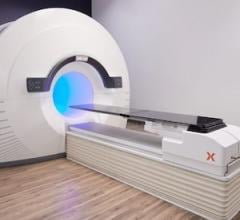
March 23, 2023 — Nuclidium announced that the Neuroendocrine Tumors Research Foundation (NETRF) has selected the company and its collaboration partner the University Hospital Basel (Universitätsspital Basel, “USB”) as recipients of its Investigator Award. The grant will support the initiation and execution of a Phase 1 clinical trial with TraceNET, a novel copper-based radiodiagnostic for detecting neuroendocrine tumors (NET). The PET imaging agent candidate is the diagnostic component of NUCLIDIUM’s theranostic program, which comprises a true theranostic pair for diagnosing and treating NET patients, leveraging the company’s unique copper-based approach. The Phase 1 program for the diagnostic is the first step in its clinical development and is planned to commence in the first half of 2023.
Nuclidium’s TraceNET program aims to overcome key limitations of existing radiodiagnostics and their corresponding therapeutics by increasing the sensitivity and diagnostic accuracy of NET imaging, including detecting metastases, while reducing the radiation burden for the patient. The TraceNET diagnostic consists of an imaging radioisotope (61Cu) and a somatostatin receptor (SSTR) antagonist-targeting molecule that binds with high affinity and specificity to SSTRs overexpressed on the surface of NET cells.
NETs are a rare cancer indication originating in neuroendocrine cells located mainly in the gastrointestinal tract and the pancreas. Often asymptomatic and difficult to detect, they are usually only diagnosed at an advanced or metastatic stage associated with significantly reduced survival rates. In addition, up to 50% of NET patients are wrongly staged, preventing them from receiving the right treatment. Currently, available therapeutics for advanced NET, including chemotherapy and targeted radiotherapy, are still facing challenges like toxic side effects, limited efficacy and availability.
Nuclidium and the USB will combine their know-how and resources for this first-in-human study with TraceNET on their joint mission to provide NET patients with a new diagnostic that offers improved precision, performance, and accessibility. The Phase 1 study will assess the safety, biodistribution, pharmacokinetics and dosimetry of TraceNET in NET patients. It will also analyze the performance of TraceNET in positron emission tomography (PET)/computed tomography (CT) imaging compared to 68Ga-DOTATOC, the current state-of-the-art imaging agent for the detection of NET in the same patients.
“The Investigator Award underlines the unique potential of our copper-based theranostic approach that, for the first time, allows the development of a true theranostic, leveraging the same radiometal and targeting molecule. There is a persistent need for better theranostics to ensure the best possible care for NET patients at all stages of their disease. Together with the USB, our vision is to set a new standard in precision oncology by enabling easy access to highly effective and safe diagnostics and treatment options for cancer patients. We are looking forward to rapidly advancing our first program TraceNET into a first-in-human trial only 1,5 years after we initiated its development,” said Leila Jaafar, PhD, CEO and Co-Founder of NUCLIDIUM.
“Despite the advancements in the field, NETs still have a low survival rate of less than 30% at advanced stages, highlighting the urgent demand for seamlessly transferrable theranostic treatment concepts. This award enables us to translate our distinct scientific concept into clinical application, which is an important step on our way to creating improved radiopharmaceuticals for cancer indications with a high medical need,” added Prof. Melpomeni Fani, PhD, PI of the Phase 1 trial and Division Head Radiopharmaceutical Chemistry at USB.
Nuclidium’s copper-based platform enables an easy adjustment of each product candidate from a diagnostic to a therapeutic by simply exchanging 61Cu with 67Cu. Through this approach, both product candidates are biodistributed in the body identically, allowing for exact dosimetry for each patient. This seamless “diagnostic to therapeutic” approach offers the potential for more personalized, efficacious, and safe NET patient care compared to other radiopharmaceuticals that use different radioisotopes and/or targeting molecules for diagnosis and treatment. Importantly, the easy-to-apply proprietary production process and half-live properties of the copper radioisotopes contribute to a superior radiotheranostic product with broad availability.
The NETRF’s Investigator Award aims to support innovative and transformative research projects to help bring the NET field closer to more effective therapies. It encourages multidisciplinary groups comprised of basic scientists, clinicians and experts across relevant cutting-edge areas to jointly apply their know-how to developing novel ideas and strategies to improve the lives of NET patients. The Investigator Award is granted to one or two applicants each year and supports projects for two years.
About Neuroendocrine Tumors
Neuroendocrine tumors (NETs) are a rare form of cancer that develops in cells of the neuroendocrine system. Spread throughout the body, neuroendocrine cells can receive neuronal input like nerve cells (neurons) and produce and release hormones like cells of the endocrine system (endocrine cells). They are mainly found scattered in the gastrointestinal tract (including the small intestine, rectum, stomach, colon, esophagus, and appendix), the gallbladder, the pancreas (islet cells) and the thyroid (C cells). NETs are difficult to detect and are usually found at an advanced stage. Like prostate cancer, the survival rate significantly drops the more advanced or metastasized the tumor is (5-year survival for metastatic pancreatic NETs: 24 %).
For more information: www.nuclidium.com


 February 04, 2026
February 04, 2026 









